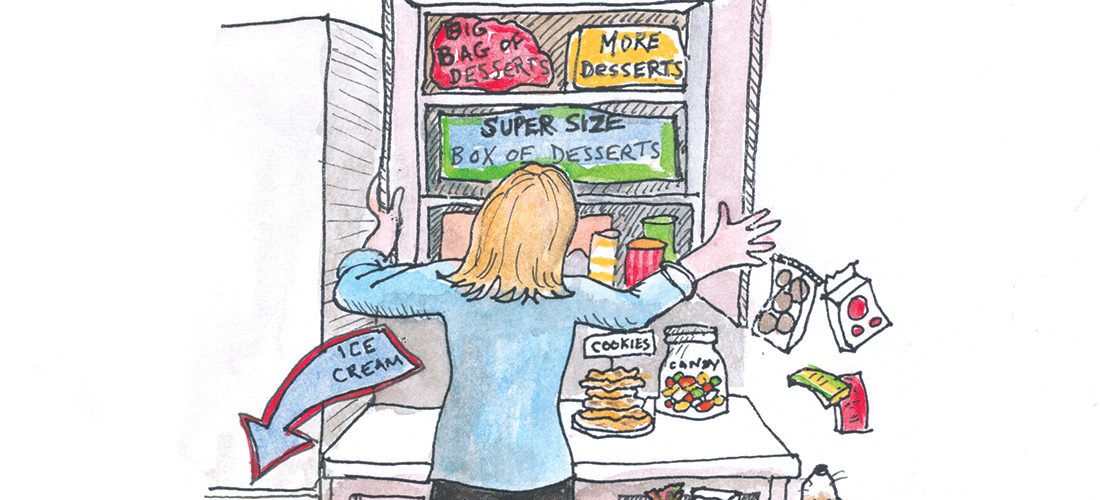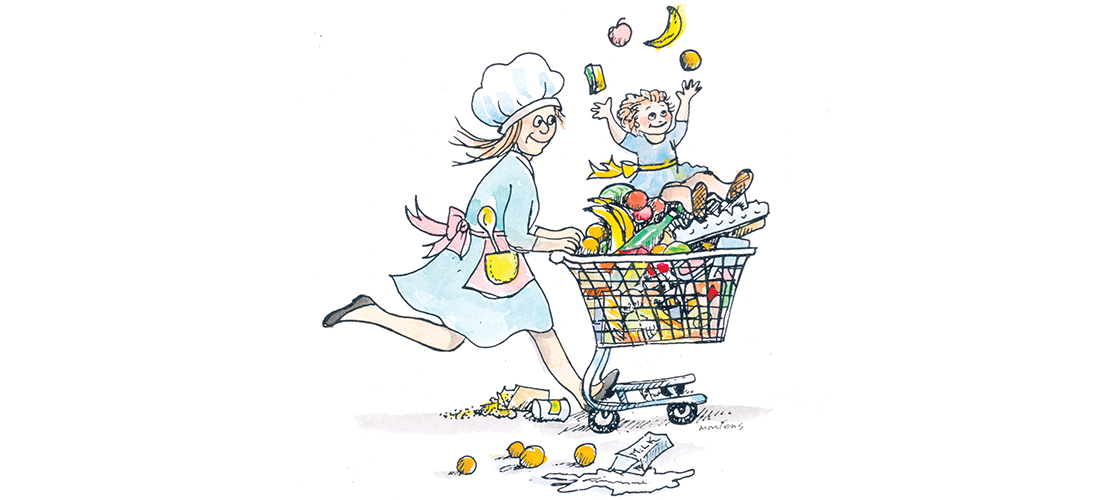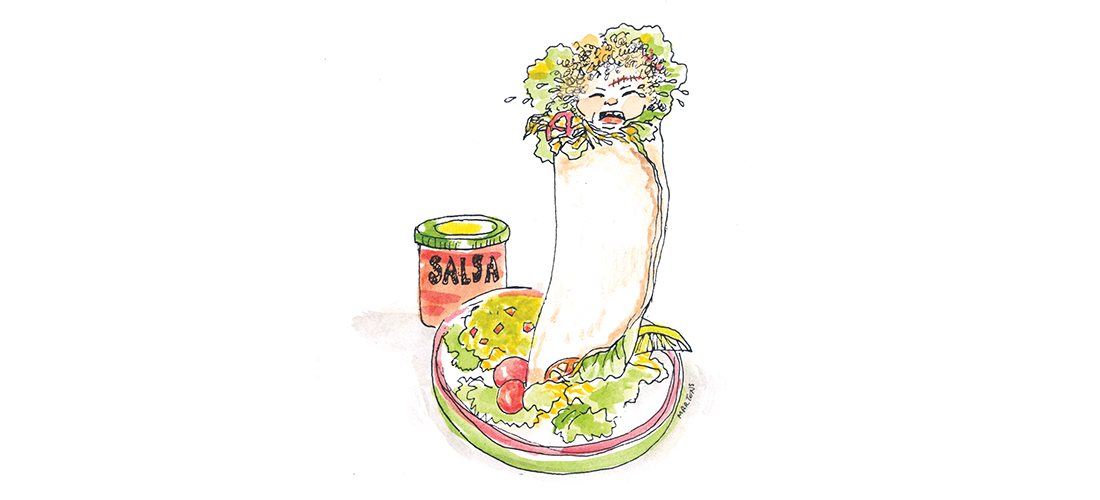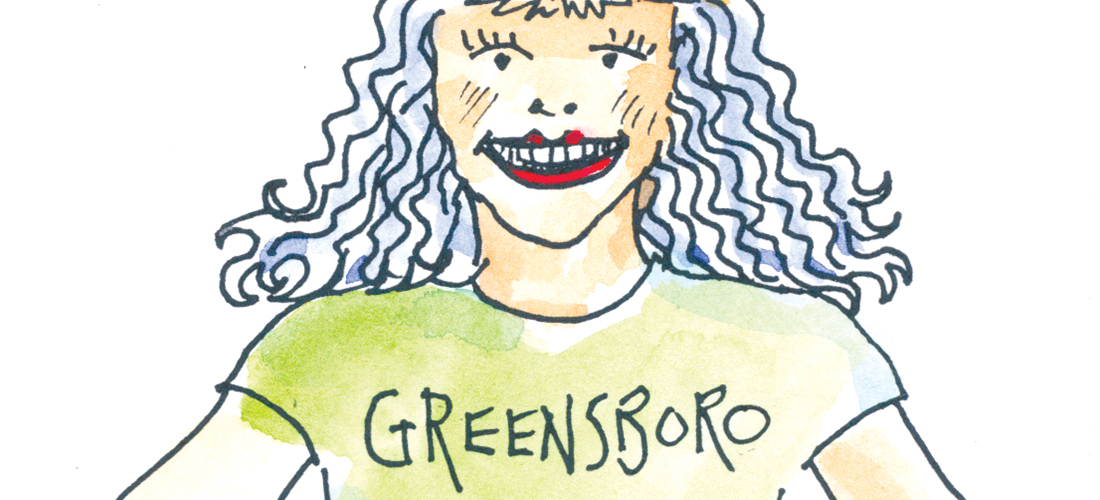Life of Jane
Just Desserts
It takes one to know one
By Jane Borden
In my parents’ home, desserts are both rewards and consolations, applied as prescription and preventative medicine alike. As such, the procurement of them is as important as the distribution. My mother likes to be prepared.
Shortly after Nathan and I were married, we made an impromptu visit to Greensboro from Chapel Hill. Mom not only welcomed us generously but also threw together an elaborate dinner for four in the dining room. Afterward, she announced, “I’m sorry, but I didn’t know you were coming, so we have nothing for dessert.” Naturally, we insisted: Dessert was unnecessary, and we were thankful for the delicious dinner, not to mention full. This was a response to the gesture behind the statement. And once it was made, I considered the statement itself. Suspiciously, I asked, “Wait, you have nothing for dessert?”
When my sisters and I were children, our kitchen pantry was legend. Across different grades and schools, word spread of the snack-food riches therein, making our house the first choice for any playdate location. I’m still not sure who were real friends, and who were mercenaries out for a payday in Little Debbie snack cakes.
They weren’t shy. They knew Mom’s organizational system and poked around freely. It was a bit like looking for coins in a video game. One employs a combination of tactics, returning to previously discovered gold mines while also seeking new sources. That was part of the fun. Our friends knew they could open the freezer door and score a few chocolate M&Ms, but also what’s behind that cereal box in the pantry? Is it one of a dozen cans of chicken consommé (a collection always stocked in case, I presume, the municipal water source became tainted and we had to drink it)? No. Is it a jar of relish that expired five years ago (that’s my dad’s organizational system)? No. Is it . . . yes, Girl Scout cookies! Wait, how old are they? Just kidding, I don’t care.
The shelves were deep. There was a lot to explore. And it required agility, considering the floor was littered with bottles of Diet Rite. I understand this culture of plenty. I inherited the trait. I go overboard, whether in my shopping cart or on my plate. “That looks good. Do I need it? Probably not. But you never know? Anyway, it might taste good. I like things that taste good. OK I’ll take it.”
For example, having a great plenty is what allows one to throw together a dinner for four in a formal dining room on short notice. Appreciation aside, however, I am biologically incapable of missing an opportunity to joke. That is how I came to do the unthinkable: endeavoring to entertain our group by making fun of Mom.
“You have nothing for dessert?” I asked, inviting her into the trap.
“Nothing!” Mom said innocently. “I feel terrible!”
“You’re sure there’s nothing?” I pressed.
“Yes!” she said.
“OK, I’ll just confirm,” I announced, rising from the table and heading first to the second refrigerator in the laundry room. “Bag of M&Ms in the drawer!” I shouted and, moving a bottle of chardonnay, added, “also a bag of jellybeans. And a box of Godivas.”
“Those don’t count,” Mom yelled back. “That’s candy!”
I next turned to the freezer: “Fudge popsicles!”
“They’re Weight Watchers,” she protested, “fake dessert.”
“And what about this homemade chocolate-covered toffee the Hassenfelts gave us for Christmas?”
“Jane,” she said, her voice now grave: “You better be careful.”
Making fun of mother is a risky venture. The situation must be perfect, or plans require, as revenge does, the digging of two graves. But any great endeavor is susceptible to circumstance, and if, when conditions do allow, our heroes fail to act, we’d never have harnessed electricity, or captured a giant squid on film. I realize I’ve just compared my mother to a giant squid, but the sound I sought — of her laughing at me laughing at her — is as rare.
I don’t mean to suggest her hard or stoic. Mom laughs constantly, and labors to elicit the same from others. She’s an entertainer. She says I get my sense of humor from my dad. Maybe. I hope so. He’s one of the funniest people I know. (Last year, when my parents visited Los Angeles, we took an Uber to Hollywood. After embarking, Dad had trouble with his seat belt, so the driver pulled over to wait. When the lock finally clicked, Dad leaned forward to the driver and cheerily announced, “OK, you can get in a wreck now!”) Regardless, I inherited my desire to entertain from her.
She’s a pro. Whether hosting a party in your honor or running into you at the Harris Teeter, Mom makes you feel special. And you can relax meanwhile, because she does all of the work, including the emotional labor. I’m not at her level. But I hope to be eventually. I’m still practicing. Anyway, it’s not my job to entertain when I’m with her. It’s hers. That duty is part of her general position as matriarch. Mom controls everything — including the comedy. If children are serfs, then my aim in mocking her was nothing short of an uprising.
But I had her cornered. I knew I was right and, more important, I knew this was funny. I pressed on to the kitchen pantry, where I found candied pecans, chocolate-covered almonds, gummy bears, and four kinds of Weight Watchers treats (caramels, minifudge bars, shortbread cookies, yogurt pretzels). I shouted out each as I found them.
“Jaaaane. . . .” she replied, threatening the outcome of my continued pursuit. This was getting worse before it got better. But if I stopped now, I’d have already lost. I had to double down.
“OK, I’m opening the kitchen freezer,” I yelled. And then she sighed loudly: resignation, a positive sign.
“Jackpot! Two kinds of ice cream, a frozen loaf of banana bread, a Skor bar, and more popsicles — not Weight Watchers.” I returned to the dining room: “17, Mom. That’s a total of 17 desserts in the house.”
She stared at me for two or three very long seconds, and then raised her eyebrows, shrugged and chuckled. It was a little thing, and also the best thing.
“OK,” she said, somewhat sarcastically. “Very funny.” OH
Jane Borden grew up in Greensboro and now lives in Los Angeles, where she currently has nine desserts in the house and gets paid to be funny.




